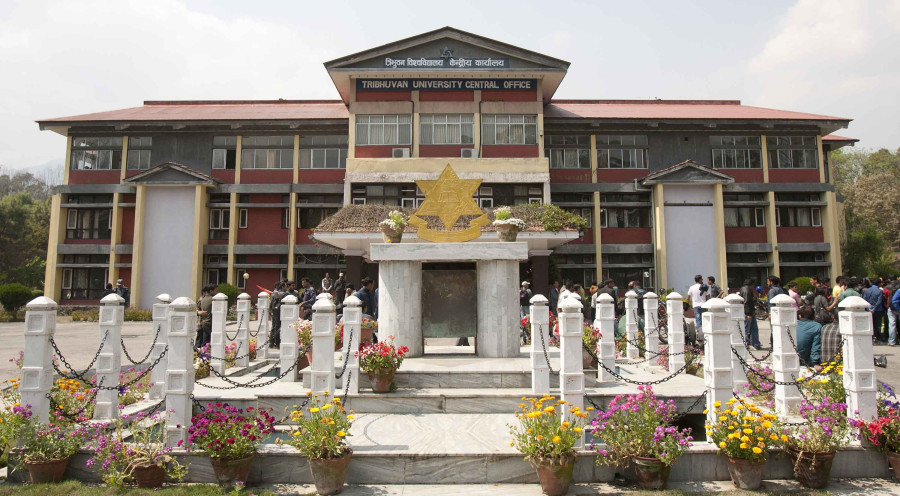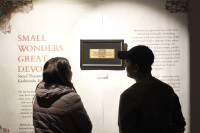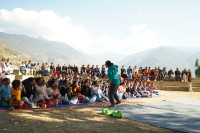Culture & Lifestyle
Will the subject of history soon be history?
A lack of job prospects and Tribhuvan University’s failure to attract a new generation to the subject have meant that fewer students are pursuing history as a discipline.
Shashwat Pant
Ram Prasad Aryal was always interested in history. Growing up in Gorkha, he read a lot about Prithvi Narayan Shah and how he had unified Nepal. He also read plenty about the French revolution and the First World War—history intrigued him. That was why after completing his high-school education in Gorkha, Aryal decided to move to Kathmandu to pursue the subject at Tribhuvan University’s Central Department of History.
But once Aryal learned about the state of the department and the lack of job prospects he decided to switch to sociology instead.
“People advised me not to take up history. They said it was not as attractive as it used to be,” says Aryal. “Coming from a middle-class family, it is expected that I find a job as soon as I graduate, which is why I had to take up a subject that was more marketable.”
Many others have come to the same conclusion as Aryal and history as a discipline of study has taken a beating over the years, with a dwindling number of students every year. There have been news reports, opinion pieces, as well as books, on the lack of history students, with academics fretting over the waning interest of students.
History was once a popular subject, say academics. In the 70s, there were many studying history, primarily because there weren’t many other options. But once courses like anthropology, sociology and management began admissions in history began to go down. For example, at Tribhuvan University, in 2013, 54 students were enrolled for the masters in history course. Only four continued for a second year. Likewise, in 2014, just 10 students enrolled in the course. None continued the following year. Last year, 18 students enrolled for a masters in history; this year, there were only five, according to the Tribhuvan University’s history department.
These decreasing numbers are concerning historians, particularly as different ethnic communities are striving to reclaim their identities and trace their own histories since the end of the Maoist insurgency. Historian Dinesh Raj Pant says that if the trend continues, much of our past—and present—could be lost.
“If more and more people stop studying history, who will the future generation go to when they want to learn about our past?” says Pant. “This will create a knowledge gap for future generations. Who will teach people about the Lichhavi or Malla eras? What will happen to all the indigenous cultures being studied by a limited number of people?”
Many argue that the decline in student numbers is due to the fact that there are few career prospects. The only jobs most history students can get are either teaching at the university as a lecturer, at the Department of Archaeology or the National Reconstruction Authority. And even these jobs aren’t guaranteed.
“As a professor, I feel quite sad for some students,” says Purushotam Lochan Shrestha, a history professor at Bhaktapur Multiple Campus. “When we were studying the subject, it attracted a lot of admiration. But currently, the job market isn’t favourable for history graduates, which is why fewer people are taking it up.”
Shankar Thapa, the head of Tribhuvan University’s history department, however, believes that it’s not just the history department that has few students; it’s a phenomenon across the social sciences and across the world, not just in Nepal.
“These subjects aren’t as popular as others, and that is why we don’t get many students,” says Thapa. “The number of students in all fields is decreasing. If you ask the various social science departments in the university, many will tell you that.”
But Pratyoush Onta, a historian and founding editor of the journal, Studies in Nepali History and Society, believes that the lack of interest is not just on the students; the history department itself must shoulder some of the blame.
“There are still good people there, but the department does need to work hard to be a bit relevant again,” he says. “It's simple things, like letting students take up interdisciplinary subjects and offering one seminar a month by inviting visiting professors to talk about certain subjects.”
It is not that there aren't people who are interested in history as an academic discipline. Every year, numerous history books, whether it is ancient, medieval, or modern history, are published and go on to do quite well. Ranahar, a historical novel by historian Yogesh Raj, won the Madan Puraskar last year.
In 2017, when Martin Chautari, the non-profit academic organisation that Onta is affiliated with, hosted a workshop on Nepali medieval history, it was very popular.
“We thought that around 15 students would show up, but the number of applicants was more than 25,” says Onta. “This showed us that there is interest amongst Nepalis. Many were even surprised that such a course was not being offered by Tribhuvan University itself.”
Both Onta and Pant believe that Tribhuvan University is constrained by its own bureaucracy. As one of the country’s oldest institutions of higher learning, Tribhuvan University has become ossified over the years and it is increasingly difficult to remove older teachers who might not be able to attract young students and induct younger, more capable teachers who are able to turn history into an attractive subject.
“When you have students complaining about how lazy teachers are, you have to question what exactly is going on,” says Pant.
With the rise in identity consciousness after the Maoist insurgency, many Nepalis are also looking for an entry point into underrepresented eras of Nepali history.
“Our country’s history is limited to the Mallas and the Shahs,” says Pant. “What they are teaching is only political history. What about the history and culture of the indigenous people? This is just as important as learning about all the dynasties that have ruled Nepal.”
The problem, according to Onta, is that Nepal has few historians, which means that there aren’t many who focus on specialised areas of history, rather than the broad strokes of historical progression.
“Nepali historians have been prolific in producing single-author monographs but the absence of thematic books, in part, explains why history as a discipline is perceived to be languishing in its own analytic uselessness in contemporary times,” he said.
The study of history is not important only because it helps people understand the past, but it actively facilitates the creation of a better future, say historians.
For Shrestha, the history professor from Bhaktapur Multiple Campus, history is a link between the past and the present.
“Many European countries have respected and understood their history to create their present and a better future,” he says. “We should learn from them.”




 9.92°C Kathmandu
9.92°C Kathmandu















